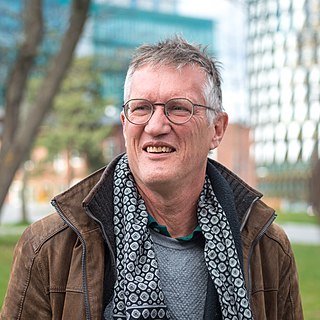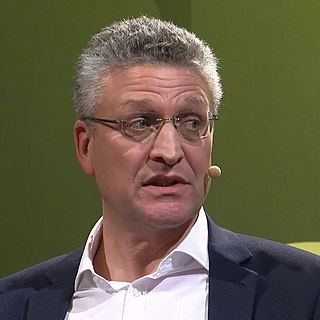Related Research Articles

The Karolinska Institute is a research-led medical university in Solna within the Stockholm urban area of Sweden and one of the foremost medical research institutes globally. The Nobel Assembly at the Karolinska Institute awards the Nobel Prize in Physiology or Medicine. The assembly consists of fifty professors from various medical disciplines at the university. The current vice-chancellor of Karolinska Institute is Annika Östman Wernerson, who took office in March 2023.

Nils Johan Artur Bejerot was a Swedish psychiatrist and criminologist best known for his work on drug abuse and for coining the phrase Stockholm syndrome. Bejerot was one of the top drug abuse researchers in Sweden. His view that drug abuse was a criminal matter and that drug use should have severe penalties was highly influential in Sweden and in other countries. He believed that the cure for drug addiction was to make drugs unavailable and socially unacceptable. He also advocated the idea that drug abuse could transition from being a symptom to a disease in itself.
Sir Roy Malcolm Anderson is a leading international authority on the epidemiology and control of infectious diseases. He is the author, with Robert May, of the most highly cited book in this field, entitled Infectious Diseases of Humans: Dynamics and Control. His early work was on the population ecology of infectious agents before focusing on the epidemiology and control of human infections. His published research includes studies of the major viral, bacterial and parasitic infections of humans, wildlife and livestock. This has included major studies on HIV, SARS, foot and mouth disease, bovine tuberculosis, bovine spongiform encephalopathy (BSE), influenza A, antibiotic resistant bacteria, the neglected tropical diseases and most recently COVID-19. Anderson is the author of over 650 peer-reviewed scientific articles with an h-index of 125.
The Health Protection Agency (HPA) was a non-departmental public body in the United Kingdom. It was set up by the UK government in 2003 to protect the public from threats to their health from infectious diseases and environmental hazards.
Tomas Hökfelt is a Swedish physician and former professor in histology at the Karolinska Institutet from 1979 until 2006, when he got his emeritate. He was linked to the Department of Neuroscience and is specialized in cell biology.
Paolo Boffetta is an Italian epidemiologist. He is doing research on cancer and other chronic diseases, where he contributed to the understanding of the role of occupation, environment, alcohol, smoking and nutrition in disease development.

SciLifeLab is a world-leading Swedish national center for large-scale research and one of the largest molecular biology research laboratories in Europe at the forefront of innovation in life sciences research, computational biology, bioinformatics, training and services in molecular biosciences with focus on health and environmental research. The center combines frontline technical expertise with advanced knowledge of translational medicine and molecular bioscience.
The Australian Institute of Tropical Health and Medicine (AITHM) is an Australian tropical health and medical research institute based at James Cook University (JCU) in Townsville and Cairns, Queensland. Formerly known as the Australian Institute of Tropical Medicine, AITHM was established at JCU in 2008.

The Public Health Agency of Sweden is a Swedish government agency with national responsibility for public health. It falls under the Ministry of Health and Social Affairs and works to promote public health and to prevent illness and injuries through education. It monitors the health of the population, infectious disease control measures, and public health interventions, and assists the Government in its decision-making process by providing facts and knowledge. The agency is tasked with minimizing negative environmental impact on human health, and participates in the work of the EU and international public health organisations, such as the WHO and IANPHI.
Gagandeep Kang FRS is an Indian microbiologist and virologist who has been leading the work on enteric diseases, diarrheal infections and disease surveillance at the Bill & Melinda Gates Foundation since 2023.

Chikwe Ihekweazu is a Nigerian epidemiologist, public health physician and the World Health Organization’s Assistant Director-General for Health Emergency Intelligence and Surveillance Systems.

Michael Joseph Ryan is an Irish epidemiologist and former trauma surgeon, specialising in infectious disease and public health. He is executive director of the World Health Organization's Health Emergencies Programme, leading the team responsible for the international containment and treatment of COVID-19. Ryan has held leadership positions and has worked on various outbreak response teams in the field to eradicate the spread of diseases including bacillary dysentery, cholera, Crimean–Congo hemorrhagic fever, Ebola, Marburg virus disease, measles, meningitis, relapsing fever, Rift Valley fever, SARS, and Shigellosis.

Nils Anders Tegnell is a Swedish civil servant and physician specialising in infectious disease. From 2013 until his resignation in March 2022 he was Sweden's state epidemiologist.
Gerda Annika Linde is a Swedish physician, virologist and retired civil servant. From 2005 to 2013 she served as State Epidemiologist at the Swedish Institute for Communicable Disease Control.

The state epidemiologist, or the chief epidemiologist is a Swedish civil servant. The current state epidemiologist is Anders Lindblom, with Anders Wallensten as deputy state epidemiologist.

Ibrahim Ibrahim Abubakar is a British-Nigerian epidemiologist who is Professor in Infectious Disease Epidemiology at University College London and Dean of the UCL Faculty of Population Health Sciences.
The Strategic Advisory Group of Experts (SAGE) is the principal advisory group to World Health Organization (WHO) for vaccines and immunization. Established in 1999 through the merging of two previous committees, notably the Scientific Advisory Group of Experts and the Global Advisory Group by Director-General of the WHO Gro Harlem Brundtland. It is charged with advising WHO on overall global policies and strategies, ranging from vaccines and biotechnology, research and development, to delivery of immunization and its linkages with other health interventions. SAGE is concerned not just with childhood vaccines and immunization, but all vaccine-preventable diseases. SAGE provide global recommendations on immunization policy and such recommendations will be further translated by advisory committee at the country level.

The Weekly Epidemiological Record (WER) is a publication of the World Health Organization (WHO) that as of 2020 is in its 95th volume. It is published in English and French with the alternative title of the Relevé épidémiologique hebdomadaire. It aims to rapidly disseminate epidemiological information about outbreaks of diseases under the International Health Regulations and about communicable diseases of public health importance. This includes emerging or re-emerging diseases.
Eleni Aklillu is an Ethiopian senior research scientist and research group leader at the Karolinska Institute. She is also a professor of tropical pharmacology at the same institute. She is a Fellow of The Royal College of Physicians Edinburgh (FRCPEdin), and a Fellow of the African Academy of Sciences and the laureate of the Donald Mackay Medal.

Lothar Heinz Wieler is a German veterinarian and microbiologist who served as president of the Robert Koch Institute (RKI) from 2015 to 2023. In this capacity, he advised the German Federal and State Governments on topics of public health, especially infection hazards, and on the containment of the COVID-19 pandemic.
References
- ↑ "Giesecke: Forskare bör hålla sig i sina områden". Svenska Dagbladet (in Swedish). 2020-03-23. ISSN 1101-2412 . Retrieved 2020-04-18.
- ↑ Giesecke, Johan (1979). On the molecular structure of dopaminergic substances. Stockholm: Balder.
- ↑ "WHO | Members of the Strategic and Technical Advisory Group for Infectious Hazards (STAG-IH)". WHO. Retrieved 2022-03-16.
- ↑ "Giesecke: "Alla andra länder gör fel"". Dagens industri. 3 April 2020. Retrieved 24 April 2020.